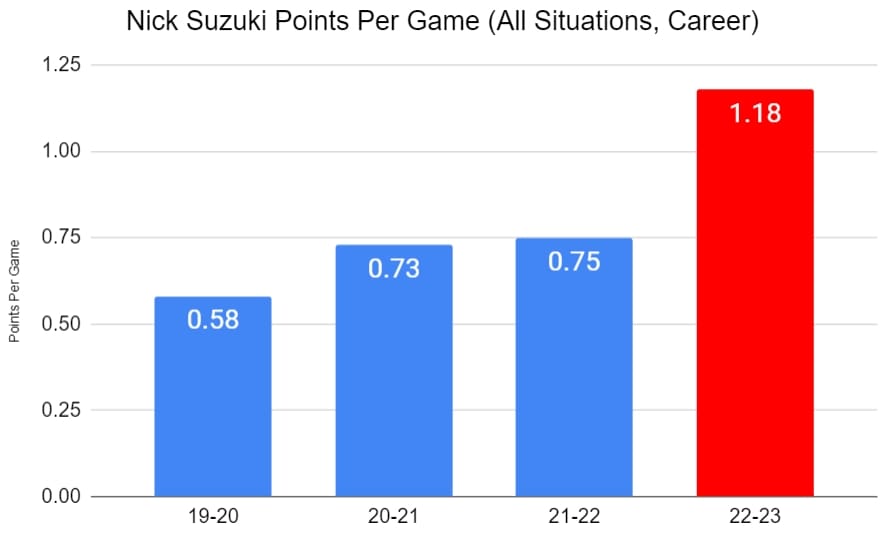Montreal Canadiens
Nick Suzuki Providing Great Early Value On New Contract

When the Montreal Canadiens signed Nick Suzuki to an 8-year contract extension with a $7.85 million annual average value, many eyebrows were raised around the league.
At that point in time, Suzuki only had two seasons under his belt, both of which resulted in 41 points, though it should be noted his second season involved a reduced schedule due to the pandemic.
By signing the richest forward contract in Canadiens history Suzuki was immediately placed in the limelight, adding significant pressure to the 21-year-old in a hockey-crazed market.
Many players would quickly wilt under such scrutiny. Suzuki thrived on it, earning over 60 points the following season on the worst team in the league.
As his contract kicked in, the momentum carried into 2022-23, with Suzuki leading all Canadiens in scoring with an impressive scoring pace over a point-per-game.
Return On Investment
But the question remains, is Suzuki providing good value on his current contract?
From a rudimentary point of view, it’s clear Suzuki has improved his production in every season since he entered the league.

But we need to dig a little deeper than just evaluating the evolution of his scoring pace.
Suzuki owns the 60th most expensive contract in the league, 40th among forwards. It stands to reason that he should be among the top 40 forwards in terms of overall production at 5v5.
He’s currently tied for 19th in points per 60, tied with some unknown forward from Edmonton called Connor McDavid. Seeing as it’s only the first year his contract extension kicked in, it’s safe to assume Suzuki is fulfilling his contractual duties as one of the top-40 forwards in the league.
But there is a significant red flag in Suzuki’s numbers, and it comes in the form of relatively poor control of the high-danger chances.
Underlying Numbers
Statistically speaking, Suzuki has maintained an even control of shots throughout his career, clocking in at a little over 50 percent in 5v5 situations (2804-2795).
However, his share of high-danger chances is much lower at 46.2 percent, which indicates that more often than not, other teams produce more scoring chances than the Canadiens when Suzuki is on the ice.
What happened?
Last season, when Nick Suzuki was on the ice, the Canadiens only controlled 41 percent of the quality chances, and while you can’t simply remove an entire season’s worth of data points from the equation, it is worth remembering the context in which he produced those numbers.
The Canadiens didn’t just have one of the worst seasons among all NHL teams, 2021-22 was one of the worst seasons in franchise history.
If we focus on the years in which Suzuki was not playing on a historically awful team, his control of high-danger chances jumps all the way to 50.1 percent.
Again, we can’t erase history, but we can contextualize it.
Many models will depend heavily on factors such as high-danger chances, and for the most part, the projections are rather accurate.
But there are always outliers, and there’s no doubt talented players on terrible teams get the short end of the stick when analyzing on-ice performances, seeing as they’re linked to four other skaters at all times.
That being said, Suzuki did struggle in that regard, though it was likely due to poor chemistry rather than questionable performances.
Third Musketeer
For example, now that Suzuki is playing on a line with Kirby Dach and Cole Caufield, we’ve seen a significant uptick in key statistical categories such as expected goals (59.1 percent), shot control (55.2 percent), high-danger shot control (55.6), and goals (80 percent).
Those aren’t just solid numbers, they’re borderline elite.
Ces deux-là!
These two! 🤩#GoHabsGo pic.twitter.com/ERZBieiiXd
— Canadiens Montréal (@CanadiensMTL) November 4, 2022
The improvement in terms of high-danger chances is the most exciting development, as it should allow Suzuki to produce through two different avenues: raw talent and high volume.
If the line can maintain strong control of the play throughout the rest of the season, not only will Suzuki’s scoring pace remain impressive, it will qualify as sustainable.
And that’s what you’re looking for in these long-term contracts, sustained value.
Seeing as this is only the first year of an eight-year contract, it’s fair to say his contract isn’t just fair value for the Canadiens, it may end up being a bargain-value deal in the next few seasons.
Given his steady growth and his chemistry with Dach and Caufield, it would be unwise to bet against it.
Nick Suzuki is only entering his prime.
In all likelihood, the best is yet to come.
(All statistics are 5v5 unless otherwise noted, via NaturalStatTrick)

